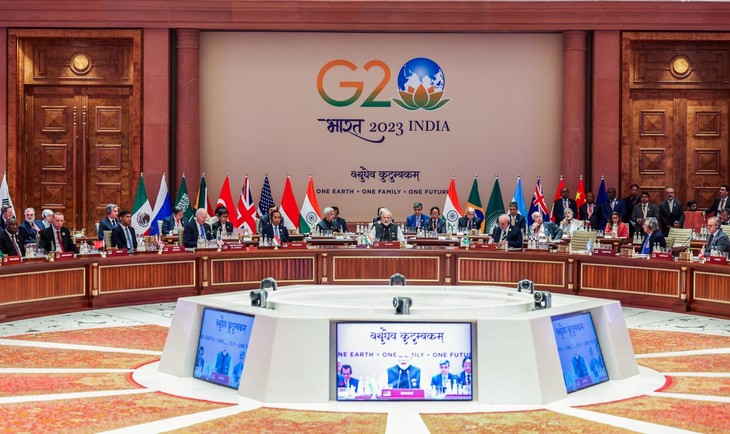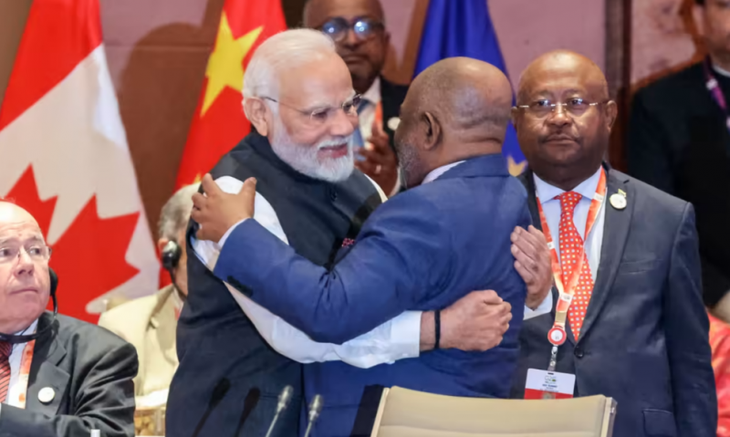(VOVWORLD) - At its summit in India’s capital New Delhi last week, the world's leading developed and emerging economies, the G20, officially invited the African Union to join the group. This is a diplomatic victory for Africa and a recognition of the increasingly important role Africa and the Global South have in global governance.
 The G20 Summit in India (photo: ANI) The G20 Summit in India (photo: ANI) |
Indian Prime Minister Narendra Modi, the host of the G20 Summit, made the invitation at the opening session on September 9 in New Delhi. The African Union will have full permanent membership in the G20 from next year's summit in Brazil and will have an equal status with the European Union instead of its current status as an “invited international organization”.
Africa’s diplomatic victory
For the African Union, which comprises 55 member states, this is a historic diplomatic victory. It has lobbied for full membership for seven years. Until now, South Africa has been the African Union’s only G20 member.
Azali Assoumani, the President of Comores and the AU Chairman, said that admitting the African Union to the G20 will correct an injustice because with 55 member countries, 1.4 billion people, and a total GDP of 3 trillion USD, the African Union deserves a voice in the organization that brings together the world's largest economies.
“The admission of the African Union into the G20 is a diplomatic victory. It sends a strong message and is a great opportunity for Africa to better protect its interests at the organization that is the center of global economic governance,” said Assoumani.
Indian Prime Minister Modi said that African Union membership in the G20 will be “a step toward a just, fair, more inclusive and representative global architecture and governance”.
Many key G20 members support the AU’s admission. Prior to the Summit, Germany campaigned strongly for the G20 to admit the African Union. US President Joe Biden said it’s been “a long time coming.” At last year's G20 Summit in Indonesia, Biden supported granting full membership to the African Union.
 Indian Prime Minister Modi (L) and Azali Assoumani, the President of Comores and the AU Chairman (photo: AFP) Indian Prime Minister Modi (L) and Azali Assoumani, the President of Comores and the AU Chairman (photo: AFP) |
Enhanced negotiating power
Kenyan President William Ruto said that full membership will allow Africa to influence the G20's decision-making, including many policies directly related to Africa's interests such as climate change response, debt reduction for poor countries, and reform of multilateral international financial institutions.
Nigerian researcher Emmanuel Igah said the G20’s invitation acknowledges the increasing role of the Global South nations in global economic and geopolitical issues. He said Africa holds particularly significant advantages of population and natural resources. Africa has a population of about 1.4 billion people, most of them very young, and is expected to double by 2050, to possess one fourth of the world's population. Africa owns 60% of the world's renewable energy resources and 30% of the mineral reserves which have an essential role in the low-carbon technologies that the world is developing to combat climate change.
Igah said: “Africa benefits greatly from joining the G20. For example, when negotiating the prices of input materials, Africa is paid very low prices for the materials exploited on its own continent, while all of Africa's largest importing countries are in the G20. Of course, first of all, Africa needs to have a common voice and address internally problems which would harm the whole continent.”
International observers say that Africa's diplomatic victory is a new sign affirming a prominent trend in the last few years – the increasing economic and geopolitical role of the Global South, which includes Africa, Asia, and Latin America.
Brazilian President Lula da Silva said that when the G20 Summit takes place in Brazil next year, the voice of the Global South will be even stronger.
With the admission of the African Union, the G20 will include 19 countries and 2 international organizations: Argentina, Australia, Brazil, Canada, China, France, Germany, India, Indonesia, Italy, Japan, Mexico, Russia, Saudi Arabia, South Africa, South Korea, Turkey, the United Kingdom, the United States, the European Union, and the African Union.